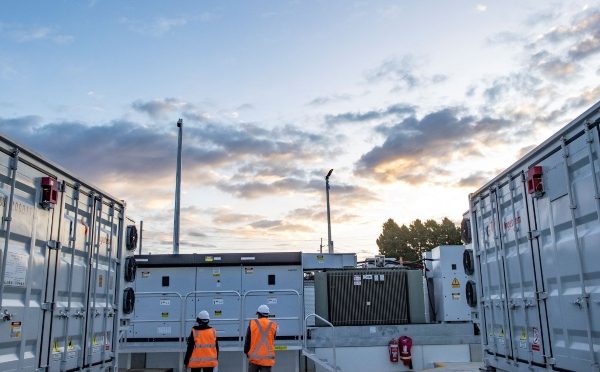Naturgy has successfully connected its first battery storage facility in the world to the grid, a historical milestone for the company in the renewables business. The ACT Battery project, located in Australia and developed and built by its international generation subsidiary Global Power Generation (GPG), will reinforce supply quality to the city of Canberra and accelerate the energy transition in the country by allowing for greater penetration of renewable energy in the grid.
Based on a 10 MW system of Lithium-Ion batteries and a storage capacity of 20 MWh, ACT Battery will be able to accumulate electricity from renewable sources and output it to the grid whenever it is needed to supply 3,000 households for two hours at times of lower electricity production.
To this effect, the facility will not only strengthen supply quality but will also contribute to promoting decarbonisation in the area, guaranteeing the continuous, stable presence of clean energy in the grid. The project is tied to the construction of the Berrybank 2 wind farm, which GPG will begin to operate in the coming months.
This Thursday, local authorities in the country visited the facilities to see the cutting-edge technology in battery development first hand. “This battery is a significant first for the city, given that energy storage via batteries is a critical component of our zero emissions future and the electrification of our city”, explained Andrew Barr, Chief Minister of Australian Capital Territory (ACT).
“Energy storage will play an important role in the reliability of Territory’s electricity supply by providing power to help avoid blackouts during periods of high demand. The ACT continues to be a leader in Australia and worldwide in its response to climate change and our renewable energy ambition. Today, it is key in our roadmap to electrification”, added Shane Ratterbury, Minister for Climate Change and Sustainability.
Pedro Serrano, GPG Chief Business Development Officer, explained that the launch of commercial operation of ACT Battery “is an important step in strengthening our contribution to the energy transition”, alluding to the Naturgy group’s firm commitment to Australia as a strategic market for promoting renewables.
Firm commitment to Australia
Australia is a priority country for Naturgy within its strategic targets for the years ahead. The group aims to reach an installed capacity of 2.2 GW between now and 2025, focused on the development of wind technology, photovoltaic solar and storage system plants such ACT Battery.
The group currently operates the Crookwell 2 and Berrybank 1 wind farms, and is about to start operating Berrybank 2. Furthermore, Naturgy is working on a solid portfolio of construction and development projects totalling 1.4 GW of power, concentrated in the states of Victoria, New South Wales, Western Australia and Queensland.
Naturgy first began operating in Australia in 2007 and has always aimed to build a solid renewable portfolio capable of providing clean energy sources and contributing to the development of rural and regional communities. The company operates in the country via its subsidiary GPG, which was set up in 2014 and in which the group holds a 75% majority stake alongside Kuwait Investment Authority (KIA), which holds the remaining 25%, and manages a total installed capacity of over 4,000 MW, employing some 500 people worldwide.
Cunderdin Project
A clear example of this commitment to the country is the company’s current investment to build its first solar hybrid project worldwide in Australia, combining photovoltaic and storage battery technologies. The recently announced Cunderdin Project will use cutting-edge technology as the first solar hybrid facility to be developed in the country, with an investment of 160 million euros.
The plant will have a solar photovoltaic capacity of 125 MW and a battery-based power storage system of up to 55MW/220 MWh. The company acquired the project from Sun Bred Power (SBP) in 2022 and began construction in the last quarter to enter commercial operation during the first quarter of 2024. The integration of a battery-based power storage system with a large-scale photovoltaic power plant will mean that the project can offer greater operational flexibility, which in turn will facilitate its ability to support the Australian wholesale energy market (SWIS) during periods of maximum energy demand in the country.


